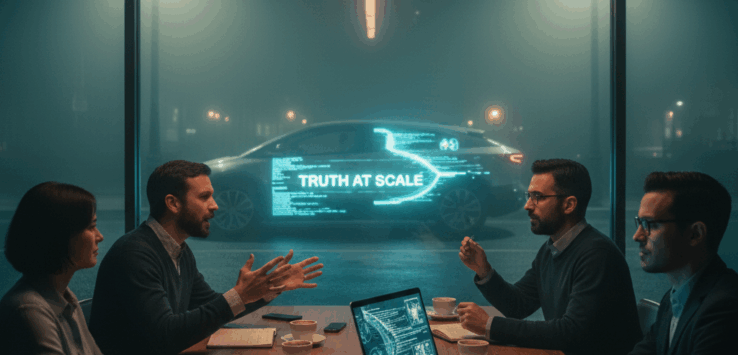It was a foggy Thursday night in Palo Alto, the kind that makes University Avenue feel like a simulation with bad rendering. Mr. X and I were at a café that only served “ethically deconstructed” coffee—meaning the barista gave you a raw bean, a QR code, and a moral dilemma.
The usual crew was there: Eric the venture capitalist, Zack the engineer, and a new addition—Tessa, a policy researcher from Stanford who once built a misinformation tracker that her lab now refuses to deploy because it “works too well.”
Eric opened the conversation the way he always does, like he’s pitching an apocalypse.
“Have you seen what GPT-9’s been doing? There’s a subreddit cataloging hallucinated conspiracies it’s invented. My favorite: a theory that Taylor Swift is actually an AI training simulation by DARPA.”
“Hey, that’s not a conspiracy,” Zack said, dead serious. “I saw the embeddings. They were too symmetrical to be human.”
Tessa groaned. “This is the problem. Everyone wants the hallucinations, but no one wants to call them lies.”
That’s when Mr. X swirled his espresso like a philosopher about to ruin the evening.
“Truth is just a poorly optimized dataset,” he said. “We don’t believe lies—we A/B test them.”
A brief silence, the kind that happens when someone accidentally says something true.
“You can’t seriously think that,” Tessa shot back. “You build the systems. Don’t you feel responsible for what they output?”
“Responsible? No one’s responsible anymore,” said Zack. “The model wrote it. The content team just reviewed it. The platform just hosted it. The advertisers just monetized it. Everyone’s guilty, which means no one is.”
Eric smirked. “You’re forgetting the users. They click whatever’s most engaging. It’s democracy by dopamine.”
Tessa looked tired. “So no one believes in truth anymore. Just the metrics around it.”
“Exactly,” said Mr. X, now visibly proud. “In the old days, you had priests and kings telling you what’s real. Now you have ranking algorithms. It’s the same thing, but with better UX.”
Zack raised his cup in a mock toast. “To progress.”
I glanced around the café. Everyone else was staring at their laptops, faces lit by artificial certainty. Somewhere between the moral fog and the blue light, the line between belief and optimization had blurred.
Outside, a self-driving car rolled past with the words Truth at Scale printed on its side. None of us laughed.



Leave a Reply